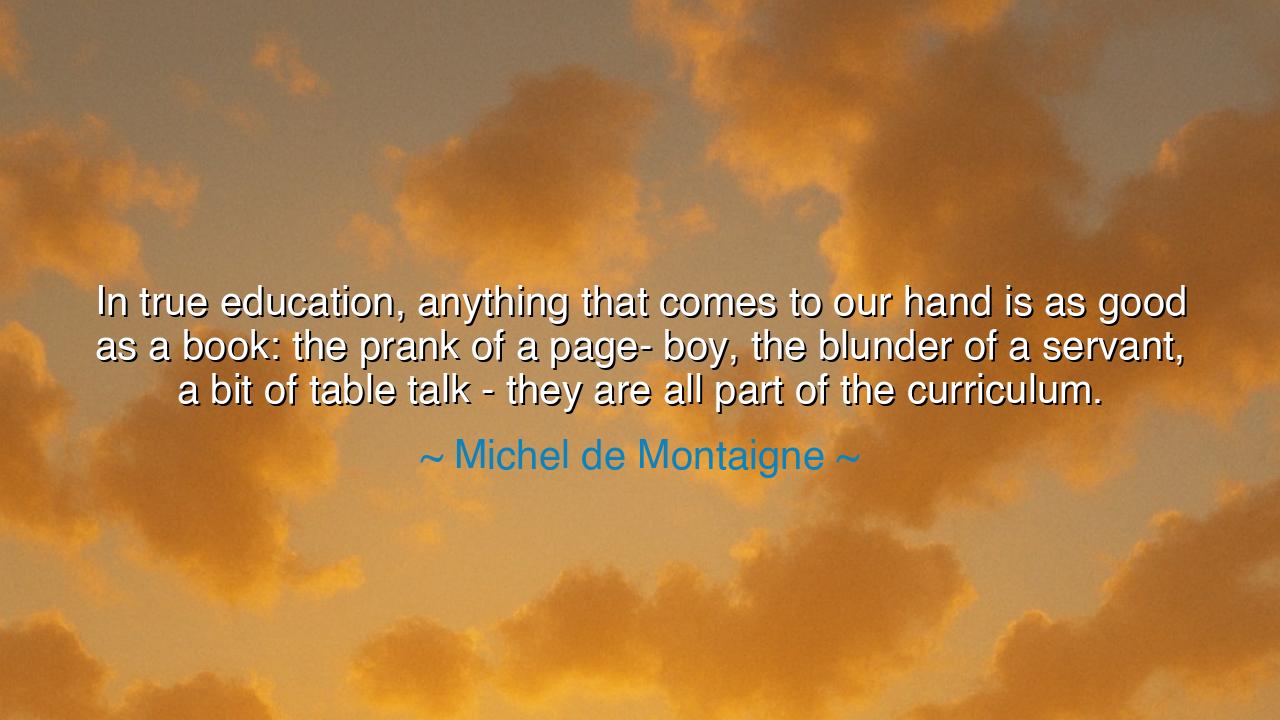
In true education, anything that comes to our hand is as good as
In true education, anything that comes to our hand is as good as a book: the prank of a page- boy, the blunder of a servant, a bit of table talk - they are all part of the curriculum.






Michel de Montaigne, the wise essayist of the Renaissance, once declared: “In true education, anything that comes to our hand is as good as a book: the prank of a page-boy, the blunder of a servant, a bit of table talk—they are all part of the curriculum.” In these words he speaks not merely of schools and classrooms, but of life itself as a grand teacher. For Montaigne knew that true education is not confined to parchment and ink, nor limited to the halls of scholars. It is everywhere—in folly and mistake, in jest and conversation, in the ordinary rhythm of daily life. The attentive soul, he teaches, may draw wisdom from every breath, while the unmindful scholar, buried in books alone, may miss the living truth unfolding before him.
The origin of these words lies in Montaigne’s great work, the Essays, where he sought to understand not only knowledge, but the art of living. He had read the ancients, studied philosophy, and walked among nobles and peasants alike. He concluded that education must be broad and alive, that wisdom lies as much in observing men as in memorizing words. To Montaigne, the curriculum was not a fixed list of subjects, but the very fabric of existence, woven of mistakes, conversations, and simple encounters. Thus, he raised daily life to the dignity of a classroom, and declared that every man, if willing, could be both student and teacher.
History offers us examples of this truth. Consider Benjamin Franklin, who had little formal schooling, yet became one of the greatest statesmen and inventors of his age. He drew wisdom from printers’ shops, from tavern debates, from the errors and successes of men in the bustling colonies. For Franklin, as for Montaigne, every moment was a lesson. The blunder of a servant could reveal humility, the chatter of neighbors could inspire invention, the mischief of children could teach the ways of human nature. In this manner, life itself was his academy, and he became both learned and wise.
Even in the great halls of ancient philosophy, we find this teaching alive. Socrates, who left no written books, learned by questioning the ordinary people of Athens—the craftsmen, the soldiers, the merchants. He drew truth not from scrolls, but from dialogue, from the raw and unpolished words of men. Every careless remark became a spark for reflection; every contradiction became a stepping stone to understanding. This is the very spirit of Montaigne’s words: the table talk of the market may contain more wisdom than the silence of a library, if only the mind listens with attention.
The meaning of Montaigne’s insight is therefore both humble and powerful. He tells us that education is not only for the scholar or the elite, but for all who walk with eyes open. The prank of a boy may reveal the impulses of youth; the mistake of a servant may show the consequences of carelessness; the chatter at dinner may unveil the beliefs and follies of society. To dismiss these as trivial is to miss the deeper lesson. To embrace them as curriculum is to grow wise in the art of living.
The lesson for us is clear: be ever a student of life. Do not wait for books alone to instruct you. Do not despise the lowly moments of the day. Instead, train yourself to see meaning in the small, to hear wisdom in the simple, to draw insight from both success and failure. For life is the greatest teacher, and its lessons are endless. The truly wise are not those who study only in schools, but those who find learning in all things.
Practical actions follow from this truth. When you err, pause and ask what the mistake teaches. When others blunder, observe with compassion and learn without pride. When you hear idle words, listen for the hidden truth beneath them. Keep a journal not only of books you read, but of daily encounters, for they too are texts to be studied. And most of all, approach life with humility, as one always enrolled in its great academy.
Thus let Montaigne’s words echo through the ages: “Anything that comes to our hand is as good as a book.” Take this wisdom to heart, and you will never lack a teacher, never lack a classroom, never lack a chance to grow. For in every prank, in every error, in every casual word, the curriculum of life is speaking—if only the soul is ready to listen.






AAdministratorAdministrator
Welcome, honored guests. Please leave a comment, we will respond soon